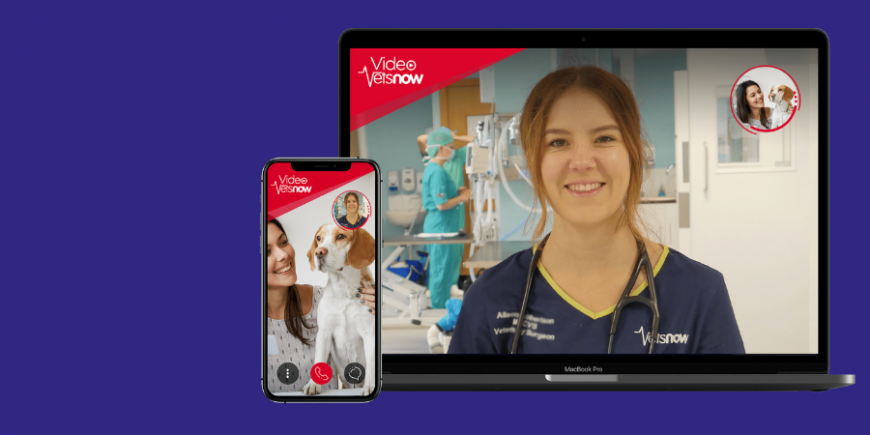Dave says the goal is to improve animal welfare and make veterinary advice accessible to everyone
Much like in human health, online veterinary services have become increasingly popular since the start of lockdown.
So much so that leading emergency vet, Vets Now, has just promoted its head of clinical intelligence, Dave Leicester, to a newly-created post, head of telehealth, to oversee what is a rapidly growing area of its business.
Here, Dave talks about the plans.
How long have you worked for Vets Now and what’s your background?
I joined Vets Now in 2004 as senior vet at our Derby clinic. Since then, I’ve held several clinical and clinical management positions, most recently as part of the Veterinary and Nursing Standards team overseeing clinical and professional standards and forging clinical policy. My professional interests have always been clinical standards, innovation and technology, so this new role is a perfect fit.
What does your new role involve?
I look after our Video Vets Now service, as well as other remote veterinary services for the business such as our voice assistant skill. I also oversee a growing team of experienced vets who provide the Video Vets Now service.
What makes you a good fit for this position?
I have a long, varied career working as an emergency vet and I hold a certificate in emergency and critical care. I’ve been at both the coalface of ECC and in clinical and operational management so I’m well-placed to speak with authority in this area, and to help our professions overcome challenges around it. It also helps that I’m into my tech.
Tell us how Video Vets Now works?
The service allows pet owners to speak to an experienced vet on their mobile, tablet or laptop, from the comfort of their home, and if their pet needs to be seen for treatment, whether at their own daytime practice or a Vets Now out-of-hours clinic or 24/7 emergency and specialty hospital, they’re refunded the consultation fee.
This is a win-win for pet owners but it’s also a positive for the veterinary sector as a whole as we’re essentially referring pet owners who come to us during the day, but require urgent treatment, to daytime first-opinion practices, regardless of whether these practices partner with Vets Now or not.
Why do you think it’s important for our professions to be at the forefront of this technology?
One of the unforeseen consequences of this awful pandemic has been the rise in popularity of video conferencing platforms and, as a result, people have become more proficient with the technology.
Even before the coronavirus pandemic, many veterinary businesses had begun moving towards using “health tech” apps and platforms.  At Vets Now, we fast-tracked our plans for video vet in response to Covid-19 as we knew how much pet owners were relying on remote veterinary advice.  However, having the technological capability to offer online consultations, where appropriate, will be beneficial for pet owners long after this pandemic has ended.
Demand for our video consultation service has been exceptional, with a surge in video calls from worried pet owners since its launch in March. This has been driven partly by the restrictions placed on people travelling and the rise in people buying pets. In the beginning, the service was only available out of hours, but the demand was so high we extended this in June to 8am to 11pm, and we are positioned to go 24/7, if the demand is there.
Telehealth has sparked a big debate across the professions. What’s your take?
The issue of telemedicine is being widely debated, particularly around the impact it might have on rural practices and the potential for misdiagnosis. Despite a temporary relaxation in the regulations regarding remote prescribing, the obligation to ensure safe and ethical care is an overriding principle, and at Vets Now, we’ve made a conscious decision not to offer remote prescribing.
Unquestionably though, appropriately managed, the advantages of video triage services far outweigh the potential risks. There is no prospect of online consultations taking over from face-to-face consults. Pets who require veterinary treatment will still need to be seen at a clinic or hospital. But they will only have to go when they need to go.
It’s also important to note that, as cases are being triaged remotely, we’ve found it frees up clinical staff where we genuinely need them. Roughly one third of our video vet calls are referred to a clinical consultation, meaning two thirds of those cases don’t need to be seen by a vet.
Also, as the pet has already been triaged by an experienced emergency vet, there’s less time spent on triage when they arrive at the clinic.
For me, the Video Vets Now service offers pet owners easy, and often immediate, access to an experienced veterinarian without having to undergo a stressful trip in the car or on public transport. This can only be good for pets, their owners, and for our professions.
Describe your working day at Vets Now?
At the moment, it’s a whirlwind of meetings and operational decisions. The service has grown so rapidly that there is a constant need to recruit and develop the team. We have a clear vision of our long-term strategy and balancing the needs of the business with the exceptional service we want to provide to our clients and their pets is the primary focus.
What’s the long-term strategy for Video Vets Now?
It’s one of Vets Now’s key business priorities. Video Vets Now is a vet-led service, and our overriding goal is to improve animal welfare and make veterinary advice accessible to everyone, through the service itself but also via our website, social channels and smart speakers.



